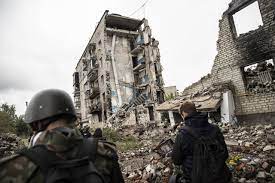
$220 of $3,129 raised
Millions of people have their lives shattered by armed conflict – wars – every year.
Some of these conflicts, notably Russia’s invasion of Ukraine, play out between states, but many more occur within a single state’s borders. In Syria, government forces, long supported by Russia, continue to fight foreign-backed armed groups for control of territory. In Somalia, fighters from the Al-Shabaab armed group continue to resist the government’s attempts to extend its control.
No matter the cause of war or the forces involved, the results are often the same. Armed conflicts mean devastating loss of civilian life, massive displacement and violations of human rights and international humanitarian law.
From Afghanistan to Yemen, Amnesty International documents and campaigns against violations of international law during armed conflicts, regardless of who the perpetrator is or where the abuse occurs. Amnesty sheds light on the increased risk of harm to at-risk groups, such as older people, children and people with disabilities. Amnesty also supports survivors’ demands for justice and accountability from national authorities and international institutions including the UN and International Criminal Court.
International humanitarian law – known as the laws of war – establishes what can and cannot be done by parties to an armed conflict. These laws seek to minimize human suffering and protect civilians as well as combatants who are no longer taking part in hostilities, such as prisoners of war. The main treaties of international humanitarian law are the 1949 Geneva Conventions, adopted after the horrors of World War Two, and their additional Protocols.
Even so, many of the gravest human rights violations are committed in war. These include using rape as a weapon of war, recruiting children to serve on the frontlines, launching direct attacks on civilians and civilian infrastructure and indiscriminate or disproportionate attacks. Warring parties may also try to weaken communities as retaliation by obstructing humanitarian aid, such as food and medicine, even using starvation as a weapon of war.
Under the laws of war, civilians may not be deliberately targeted, although they may still be killed or injured if this happens as part of a proportionate attack on a military target. All parties to the conflict must take measures to minimize harm to civilians and “civilian objects” (such as residential buildings, schools and hospitals), and must not carry out attacks that fail to distinguish between civilians and combatants, or which cause disproportionate harm to civilians.
Some of the most serious crimes under international law are committed during armed conflicts. These include:
War crimes – serious violations of international humanitarian law that include wilful killings, direct attacks on civilians, torture, use of prohibited weapons, the murder or ill-treatment of prisoners of war or others who have been captured, surrendered or injured and crimes of sexual violence.
Crimes against humanity – crimes committed as part of a widespread or systematic attack by or on behalf of a state or an organization against a civilian population during peace or wartime. There are 11 crimes against humanity including murder, extermination, enslavement, deportation or forcible transfer of a population, torture, rape and other serious forms of sexual violence, enforced disappearance and apartheid. Crimes against humanity may be committed in armed conflict or in peacetime.
Genocide – certain acts committed with the intent to destroy, completely or partially, a national, ethnic, racial or religious group. Genocide may be committed in armed conflict or in peacetime.
Over time, the international community has established specialized courts to hold perpetrators of crimes under international law to account, such as the ad hoc tribunals for the former Yugoslavia, Rwanda and Sierra Leone. International justice is also served by the International Criminal Court (ICC), which recorded its first conviction in March 2012 against Thomas Lubanga, the leader of an armed group in Democratic Republic of Congo.
States can also use the principle of universal jurisdiction to pursue their own prosecutions of perpetrators of war crimes and other crimes under international law.
Following an extensive investigation, Amnesty International concluded that Russian military forces committed a war crime when they struck the Mariupol theatre in Ukraine on 16 March 2022, killing at least a dozen civilians.
Its findings, based on interviews with numerous survivors, forensic architecture and extensive digital evidence, indicated that the attack was almost certainly carried out by Russian fighter aircraft dropping two 500 kg bombs that struck close to each other and detonated simultaneously.
Amnesty International concluded it was likely Russian military forces deliberately targeted the theatre despite knowing hundreds of civilians were sheltering there – making the attack a clear war crime.
Warfare is constantly evolving and so are the weapons used in conflict. International humanitarian law expressly forbids the use of weapons that are indiscriminate in nature. Such weapons cannot be used in a manner that distinguishes between civilians and combatants or between civilian objects and military objectives. They are often inaccurate and cause disproportionate damage. International humanitarian law also prohibits the use of weapons that cause superfluous injury and unnecessary suffering,
Weapons which have been banned by specific treaties include:
Other weapons, such as very large aerial bombs or salvos of unguided rockets, may not be banned, but they have a significant detrimental effect when used among large groups of civilians. Amnesty International strongly supports the Explosive Weapons in Populated Areas political declaration, that seeks to limit the harmful effects of these weapons on vulnerable groups.
Amnesty International also led the fight for a binding Arms Trade Treaty, which has been ratified by 111 states and went into effect in December 2014. Now the human rights implications of arms sales must be considered before states sell each other weapons, and Amnesty International’s vigorous investigations and monitoring of the enforcement mechanisms has meant we have helped stop harmful arms transfers all over the world.
